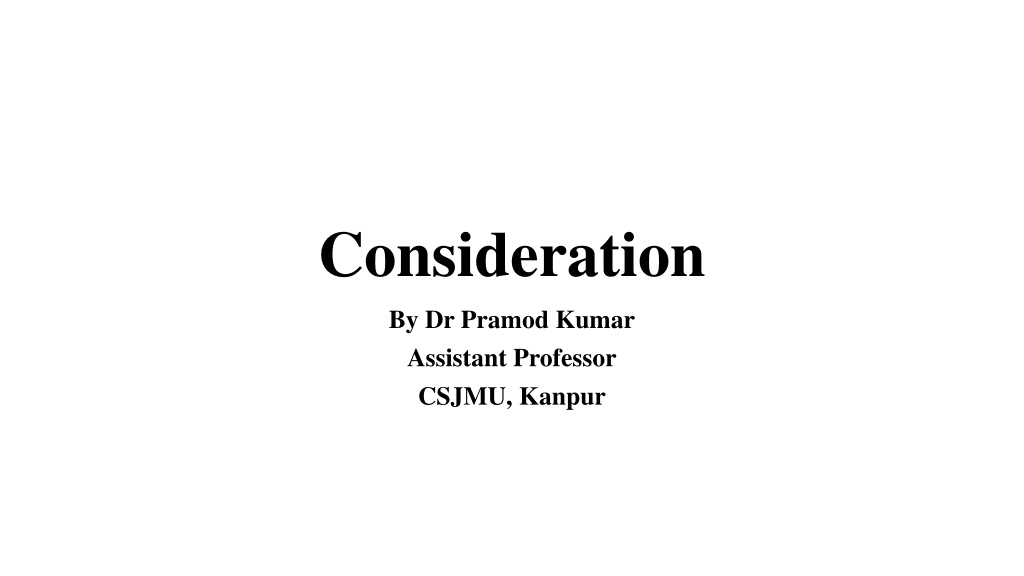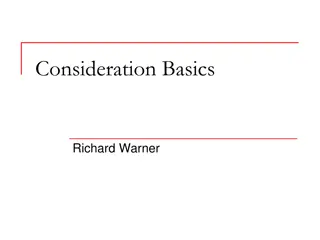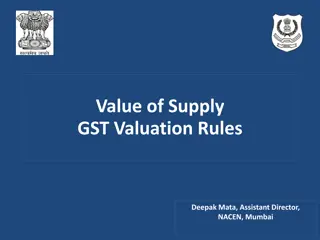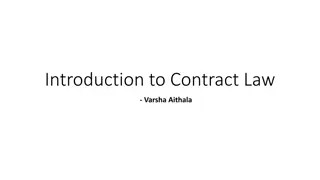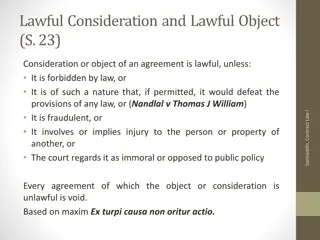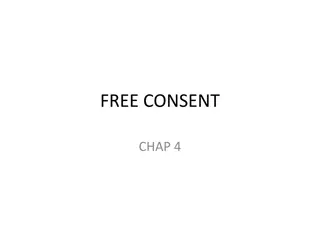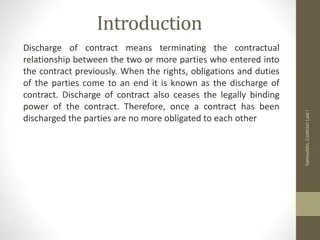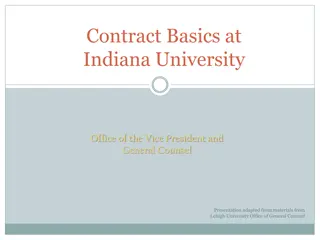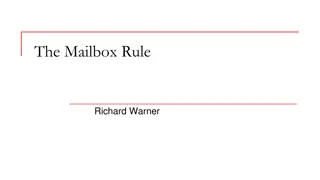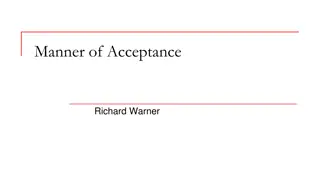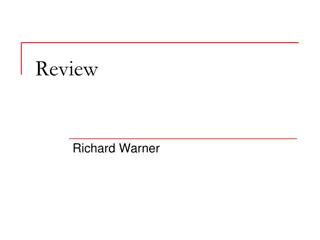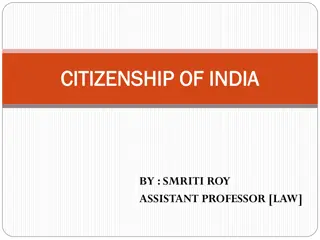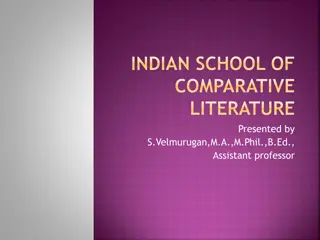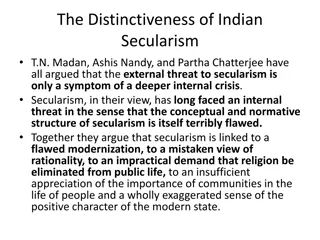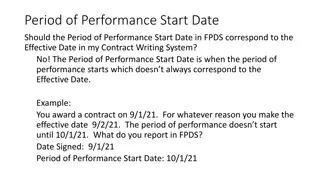Understanding Consideration in Indian Contract Law
Consideration in Indian Contract Law is defined as the price for a promise and is essential for enforceability. It involves actions done or abstained from doing in the past, present, or future at the desire of the promisor. An agreement without consideration is void unless it meets specific criteria outlined in Section 25 of the Indian Contract Act, 1872. The legal maxim "Ex nudo pacto non oritur action" emphasizes the importance of consideration in contracts.
Download Presentation

Please find below an Image/Link to download the presentation.
The content on the website is provided AS IS for your information and personal use only. It may not be sold, licensed, or shared on other websites without obtaining consent from the author. Download presentation by click this link. If you encounter any issues during the download, it is possible that the publisher has removed the file from their server.
E N D
Presentation Transcript
Consideration By Dr Pramod Kumar Assistant Professor CSJMU, Kanpur
Definition According to Pollock:- Consideration is the price for which the promise of other is brought & the promise thus given for value is enforceable. According to Patterson:- Consideration is something which is of some value in the eyes of the law. It may be some benefit to the plaintiff or some determinant to the defendant. Section 2(d) of the Act defines Consideration as When, at the desire of the promisor, the promisee or any other person has done or abstained from doing, or does or abstains from doing, or promises to do or to abstain from doing, something, such act or abstinence or promise is called a consideration for the promise;
Definition According to section 2(d) of the Indian Contract Act, when at the desire of the promisor, if the promisee or any other person: has done or abstained from doing (past), does or abstains from doing (present), promises to do or abstains from doing (future), such an act or abstinence is known as consideration.
Definition The legal maxim Ex nudo pacto non oritur action , means Agreement without consideration is void . This principle is embodied in Section 25 The ContractAct, 1872. Section 25: Agreement without consideration, void, unless it is in writing and registered, or is a promise to compensate for something done or is a promise to pay a debt barred by limitation law.-----An agreement made without consideration is void, unless (1) it is expressed in writing and registered under the law for the time being in force for the registration of 1 [documents], and is made on account of natural love and affection between parties standing in a near relation to each other ; or unless; (2) it is a promise to compensate, wholly or in part, a person who has already voluntarily done something for the promisor, or something which the promisor was legally compellable to do; or unless;
Definition (3) it is a promise, made in writing and signed by the person to be charged therewith, or by his agent generally or specially authorized in that behalf, to pay wholly or in part a debt of which the creditor might have enforced payment but for the law for the limitation of suits. In any of these cases, such an agreement is a contract. Explanation 1. Nothing in this section shall affect the validity, as between the donor and donee, of any gift actually made. Explanation 2. An agreement to which the consent of the promisor is freely given is not void merely because the consideration is inadequate; but the inadequacy of the consideration may be taken into account by the Court in determining the question whether the consent of the promisor was freely given.
Illustrations (a) Apromises, for no consideration, to give to B Rs. 1,000. This is a void agreement. (b) A, for natural love and affection, promises to give his son, B, Rs. 1,000. A puts his promise to B into writing and registers it. This is a contract. (c) Afinds B s purse and gives it to him. B promises to giveARs. 50. This is a contract. (d) A supports B s infant son. B promises to pay A s expenses in so doing. This is a contract. (e) A owes B Rs. 1,000, but the debt is barred by the Limitation Act. A signs a written promise to pay B Rs. 500 on account of the debt. This is a contract. (f) A agrees to sell a horse worth Rs. 1,000 for Rs. 10. A s consent to the agreement was freely given. The agreement is a contract notwithstanding the inadequacy of the consideration. (g) A agrees to sell a horse worth Rs. 1,000 for Rs. 10. A denies that his consent to the agreement was freely given. The inadequacy of the consideration is a fact which the Court should take into account in considering whether or notA s consent was freely given.
Essential of Valid Consideration Consideration must be given at the desire of the promisor. Consideration may be given by the promisee or any other person. Consideration may be in the past, present or future. Consideration must be real, certain and lawful. Consideration may be positive or negative. Consideration need not be adequate.
Consideration must be given at the desire of the promisor The consideration should be given at the desire of the promisor, not that of the third person. The act done at the plaintiff s desire may be of no significance or personal benefit to the plaintiff it will be considered a good consideration. Durga Prasad vs Baldeo (1880): In this case, the defendant spent some money on construction at the desire of the district s collector. Plaintiff promised to pay commission to the defendant on articles sold by him in the market in which he occupied a shop. It was held that there was no consideration for the promise made by the plaintiff and hence no contract as he had not constructed that market at the plaintiff s instance.
Consideration may be given by the Promisee or Any Other Person The consideration doesn t need to be given by the promisee. It may come from any other person also. It is immaterial as to who furnished it. Chinnaya vs Ramayya: In this case, an old lady gifted her entire property to her daughter under the condition that she would give annuity to her uncle. Annuity means paying someone a fixed sum of money each year, typically for the rest of their life. She agreed to pay annuity but stopped after some time and filed a plea that no consideration was moved by her uncle. The court rejected the plea and held that indirect consideration was already moved by her aunt.
Consideration May Be Past, Present or Future The past, present, and future nature of the consideration can be inferred from the definition of consideration as given under section 2(d) of the Indian Contract Act. A consideration is called past consideration when the act is done before any promise is made. Example: X renders his service to Y, and Y promises to pay a sum of 500 for the service after a month. This is past consideration. When consideration is given simultaneously with the promise is called present consideration. It is also known as executed consideration. Example: Sale of an article in cash. When a promise is made to do or abstain from doing something in future, it is called future consideration. It is also known as executory consideration. It is a promise for a promise. Example: X agrees to sell Y 10 quintals of wheat at 10000 when they will be harvested.
Consideration May be Real, Certain and Lawful In a contract where consideration is unreal, uncertain or unlawful, such contract is void. If X agrees to sell his car to Y at whatever price he wants to pay is an uncertain consideration. If Y promises to pay 10000 to X to beat up Z, it is an illegal consideration.
Consideration May Be Positive or Negative There should be some act or abstinence. Consideration may be positive when the promisee does something at the express wish of the promisor. Consideration may be negative when the promisee is abstained from doing something at the wish of the promisor.
Consideration need not be Adequate Consideration need not necessarily be adequate. The law provides that there should be a consideration for a valid contract. It may or may not be adequate. The adequacy of consideration is for the parties to consider at the time of agreement. A contract cannot be held invalid on the grounds of the inadequacy of consideration. For instance, X decides to sell his wheat produce valued at 10000 for 2000 to Y. Such agreement will be deemed to be a contract if X has free consent.
Exceptions of Consideration i)Agreement or Promise made due to natural love and affection. ii) Promise to compensate a person who has already voluntarily done something for the promisor or something which the promisor was legally compellable to do. iii) Promise to pay a time-barred debt.
Cases on Consideration Cases on Consideration
